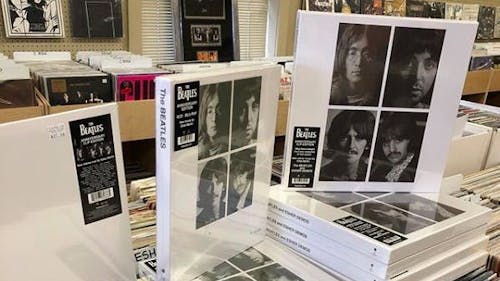Long, Long, Long: Deluxe editions of albums are new norm

As streaming becomes a crucial source of revenue, the music industry is finding it hard to justify what makes an exclusive album so “exclusive.” Nowadays, most people find it more convenient to listen to new albums through streaming websites and programs, such as Spotify, Pandora and Soundcloud. These types of programs are easy, efficient and affordable. Buying the deluxe albums are often questioned by many consumers: if it's already online, what makes spending more money for one extra song so special?
While most of us think of deluxe editions as special products aimed at a small group of “super-fans,” they are often celebrated for the behind the scenes look and the extra content in the form of bonus tracks or videos that the artist released separately. Although some may see it as a disadvantage that they now have to pay more for one extra song, it actually brings in more sales than we think. “Deluxe editions in the first few weeks after an album's release can sell more than their standard counterparts, and even account for more than two-thirds of first-week sales," according to Billboard. Those sales fade fast. But the revenue they bring in can make such a significant impact on a project that they've become an important part of planning.
“Deluxe editions have completely reshaped the reissue business, to the point that catalog labels now release multiple versions of almost every project. In the last few years, we've done more multi-tiered versions of releases than ever before," said Rhino Entertainment President Mark Pinkus.
In November 1968, millions of double Long Players (LPs) were shipped to record stores worldwide, with the year’s most anticipated musical event: the Nov. 22 release of The Beatles' “The Beatles,” or "The White Album." Now, in honor of its 50th anniversary, the band’s record label released a special edition that includes outtakes, demos and more exclusive content. For the first time since the original release, the album has been remixed and will be presented with this new content. With many different opinions, according to some Apple iTunes reviews, people are questioning, “do we really need this," or that “bonus material is lacking.” Some fans are asking why one would pay $70 for something remastered when the original songs are priceless and historic. Those who see this re-mastering as a once-in-a-lifetime purchase seem to love the unique touch to the songs and that they “can’t get enough, yet it's also bittersweet.” Despite mixed opinions, sales did not seem to be diminished. One day after the Nov. 9 release of the eagerly awaited 50th anniversary, “the 7-disc Super Deluxe Edition vaulted to the #1 spot on Amazon in the U.S," according to Apple Corps Ltd.
Similar to the re-release of "The Beatles," it isn't surprising how other record labels take advantage of the opportunities for the release of remasterings or deluxe editions. Thanks in no small part to the new Freddie Mercury biopic, the Nov. 2 re-release of Queen’s “Bohemian Rhapsody” is taking advantage of the consumers wallets and nostalgia. Coming all the way from “A Night at the Opera” to “Greatest Hits,” the recent soundtrack that followed the film reminds people just why they love the band. Many iTunes reviews also said that although they did not need another album, at least the record label provided them with the addition of five songs from the band’s dramatic 1985 Live Aid performance.
Creating the deluxe album is not easy, as industries hope to make the music as authentic as they can and try to stay close to the original artist’s style. But whether deluxe albums are just concerned with money-making or if they truly care about the fans is still questionable. The music industry will keep coming out with deluxe albums as long as it brings in revenue, so the question remains: how many reissues does it take until even a super-fan has had enough?



